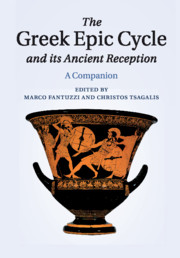Book contents
- Frontmatter
- Contents
- List of illustrations
- List of contributors
- Editorial note
- Introduction: Kyklos, the Epic Cycle and Cyclic poetry
- PART I APPROACHES TO THE EPIC CYCLE
- PART II EPICS
- PART III THE FORTUNE OF THE EPIC CYCLE IN THE ANCIENT WORLD
- 22 The aesthetics of sequentiality and its discontents
- 23 The Epic Cycle, Stesichorus, and Ibycus
- 24 Pindar's Cycle
- 25 Tragedy and the Epic Cycle
- 26 The Hellenistic reception of the Epic Cycle
- 27 Running rings round Troy: Recycling the ‘Epic Circle’ in Hellenistic and Roman art
- 28 Virgil and the Epic Cycle
- 29 Ovid and the Epic Cycle
- 30 Statius' Achilleid and the Cypria
- 31 The Epic Cycle and the ancient novel
- 32 The Epic Cycle and imperial Greek epic
- Works cited
- Index of principal passages
- Index nominum et rerum
23 - The Epic Cycle, Stesichorus, and Ibycus
from PART III - THE FORTUNE OF THE EPIC CYCLE IN THE ANCIENT WORLD
Published online by Cambridge University Press: 05 August 2015
- Frontmatter
- Contents
- List of illustrations
- List of contributors
- Editorial note
- Introduction: Kyklos, the Epic Cycle and Cyclic poetry
- PART I APPROACHES TO THE EPIC CYCLE
- PART II EPICS
- PART III THE FORTUNE OF THE EPIC CYCLE IN THE ANCIENT WORLD
- 22 The aesthetics of sequentiality and its discontents
- 23 The Epic Cycle, Stesichorus, and Ibycus
- 24 Pindar's Cycle
- 25 Tragedy and the Epic Cycle
- 26 The Hellenistic reception of the Epic Cycle
- 27 Running rings round Troy: Recycling the ‘Epic Circle’ in Hellenistic and Roman art
- 28 Virgil and the Epic Cycle
- 29 Ovid and the Epic Cycle
- 30 Statius' Achilleid and the Cypria
- 31 The Epic Cycle and the ancient novel
- 32 The Epic Cycle and imperial Greek epic
- Works cited
- Index of principal passages
- Index nominum et rerum
Summary
We do not know whether the seventh-/sixth-century poets of the Epic Cycle really saw it as their role to simply fill in the gaps left by the magisterial Homer. Indeed, our impression of their structural reliance on the Iliad and Odyssey may be due simply to the bad press they enjoyed with some critics after Aristotle, or the compact form their narratives took in the summaries that we know them from. But there is sufficient evidence to surmise that at least the sixth-century retellings of the Epic Cycle by the poets Stesichorus and Ibycus approach these tales in a manner that was innovative and cannot be reduced simply to a complementary relationship. Although Stesichorus and Ibycus were often confused with each other in antiquity and ancient commentators disagreed regarding the authorship of many of their works, as far as their approaches to the Iliad, the Odyssey and the broader epic tradition is concerned their differences are rather clear. In this chapter, I will examine both of them – first Stesichorus, then Ibycus – against the backdrop of their literary forerunners.
For pseudo-Longinus (Subl. 13.3) Stesichorus is ‘most Homeric’, and for Dio Chrysostom he was ‘an imitator of Homer’ (Or. 2.33), while Quintilian 10.1.62 speaks of Stesichorus as epici carminis onera lyra sustinentem. Simonides PMG F 564.4 also comments on the thematic similarity between the poems of Homer and Stesichorus and Antipater hails Stesichorus as the reincarnation of Homer (A.P. 7.75). Such references by the ancient critics highlight the typically epic nature of Stesichorus' diction, the relevance of the dactylic foot to his versification, the frequent occurrence of epic myths and characters in his works, as well as the expansive dimension of his narrative style, all of which can be labelled ‘Homeric’ features. Of course, for Stesichorus, as for probably everyone down to the fifth century, ‘Homeric’ meant ‘referring to the Iliad, the Odyssey and the Cyclic poems’. Accordingly, what little remains from the poems shows that it would be mistaken to view them as derived solely from Homeric poetry and offers sufficient clues to suggest that Stesichorus was ‘Cyclic’ almost as much as ‘Homeric’ (in our sense).
- Type
- Chapter
- Information
- The Greek Epic Cycle and its Ancient ReceptionA Companion, pp. 430 - 449Publisher: Cambridge University PressPrint publication year: 2015
- 3
- Cited by



